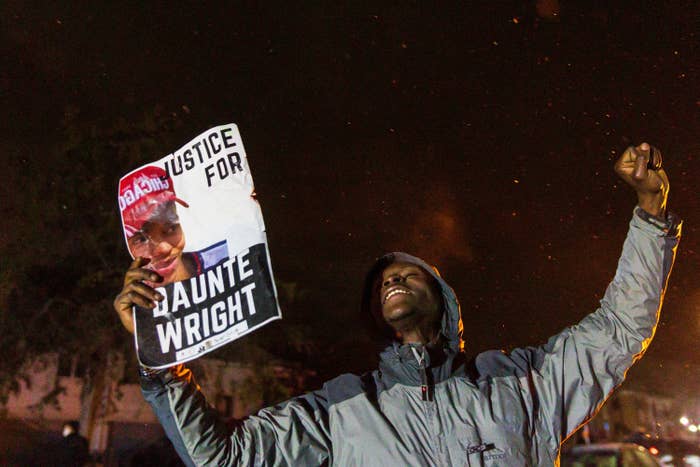
Former Minnesota police officer Kim Potter was found guilty on manslaughter charges by a jury on Thursday for fatally shooting Daunte Wright.
Potter remained composed as Hennepin County District Judge Regina Chu announced the convictions on two charges: first-degree manslaughter predicated on reckless use/handling of a firearm and second-degree manslaughter.
Potter now faces several years in prison. She will be sentenced on Feb. 18.
The former officer was handcuffed and taken into custody after the verdict was announced, despite a request from her attorneys that she remain out on bail until she is sentenced. "I cannot treat this case differently from any other case," Chu said.
Wright's mother, Katie Bryant, told reporters after the verdict that she was overcome with emotion to hear Potter be convicted. "I kind of let out a yelp because it was built up in the anticipation of what was to come while we were waiting the last few days," she said.
Minnesota Attorney General Keith Ellison said police officers in the state are held in high regard — and to high standards. The conviction, he said, "shows the whole world that those of you who enforce the law are also having to live by it, and that's a good thing."
"We have a degree of accountability for Daunte's death," he said. "Accountability is not justice. Justice is restoration. Justice would be restoring Daunte to life and making the Wright family whole again. Justice is beyond the reach that we have in this life for Daunte."
The jury had earlier indicated they were heading toward a potential deadlock, asking the judge on Tuesday what they should do if they were unable to reach a verdict. They were instructed to continue deliberating and did so for almost four days in total.

Potter’s conviction comes after she killed the 20-year-old Black motorist during an April 11 traffic stop in the Minneapolis suburbs when the 26-year veteran of the Brooklyn Center Police Department accidentally reached for her handgun instead of her Taser.
“This was no little oopsie,” prosecutor Erin Eldridge told the 12 members of the jury in closing arguments on Monday. “This was not putting the wrong date on a check. This was not entering the wrong password somewhere. This was a colossal screwup, a blunder of epic proportions.”
The deadly accident was caught on police body camera footage that showed Potter yelling “Taser” before she fired her handgun. “Oh, shit. I shot him. I grabbed the wrong fucking gun,” she then said. “Oh my god, oh my god, oh my god. I’m going to prison."
Potter was subsequently charged with first- and second-degree manslaughter over Wright’s death. To convict her, prosecutors had to prove she acted with recklessness or culpable negligence when she defied years of training and mixed up the weapons.
Potter, who resigned after the incident, had always admitted to the shooting but had been adamant that it was an accident during a police encounter that was quickly spiraling out of control and for which she did not deserve to go to prison. “I’m sorry it happened. I’m so sorry,” Potter testified last week. “I didn’t want to hurt anybody.”

Defense attorney Earl Gray said Potter had “made a mistake” that could not be seen as a crime.
Instead, Gray sought to place blame on Wright for seeking to flee as officers tried to arrest him — actions, Gray said, that put police in danger and to which Potter had been trying to respond with an appropriate, but ultimately mistaken and fatal, use of force.
“Daunte Wright caused his own death, unfortunately,” Gray said in closing arguments. “Those are the cold hard facts of the evidence.”
Wright had been on his way to a car wash when Potter and a junior officer she was training pulled him over after noticing he had expired tags and an air freshener hanging from the rearview mirror, a violation of state law. Potter testified that had she been alone she would likely not have stopped Wright, saying that an air freshener was a minor violation and that people were having trouble updating their registrations at the DMV due to the coronavirus pandemic.
But when they did a search of his name, they discovered there was a warrant out for his arrest. Wright had missed a court appearance for two misdemeanor charges: carrying a handgun without a permit and running from police last June.
Learning of the gun charge, Potter said, made her and her fellow officers wary that Wright might have a weapon on him. However, she conceded in court that she did not see any weapon in Wright’s possession and that he never threatened or punched her or her fellow officers.
Alayna Albrecht-Payton, Wright’s girlfriend, was with him during the traffic stop and testified that Wright had been “nervous and flustered” during the police encounter.
She tearfully recalled in court how Wright had been on the phone with his mother when he was shot, and how Albrecht-Payton tried in vain to save his life.
“I didn’t know what to do, so I just put my hands over his chest and tried to hold [the wound] and tried to scream his name,” she said. “I just tried to have him talk to me. I just kept saying, ‘Daunte, Daunte, just say something please, just talk to me.' And he just couldn’t — I know he tried, I know he wanted to.”
"I replay that image in my head daily," Albrecht-Payton said.
Wright’s mother, Bryant, also testified in court, describing how she had frantically tried to call her son back, only to have Albrecht-Payton answer and begin screaming. "She said that they shot him and she faced the phone toward the driver's seat," Bryant said. "My son was lying there."
The fatal shooting reignited protests against police killings in Minneapolis, a city that had already been shaken by the murder of George Floyd less than a year earlier. Dozens of people were arrested.
Prosecutors sought to portray Potter as an experienced veteran of the force who had undergone extensive annual training on Taser use, only to act with extreme recklessness.
“Accidents,” Eldridge said, “can still be crimes.”
